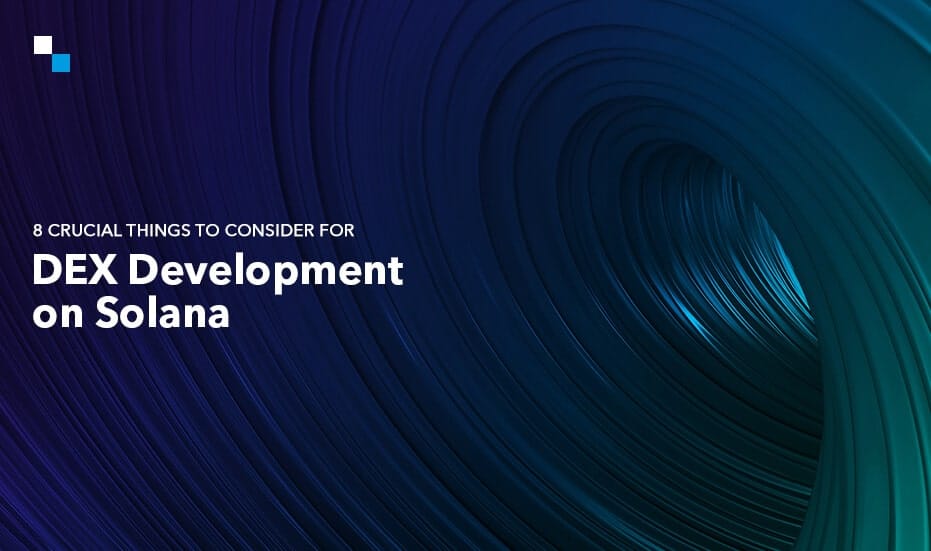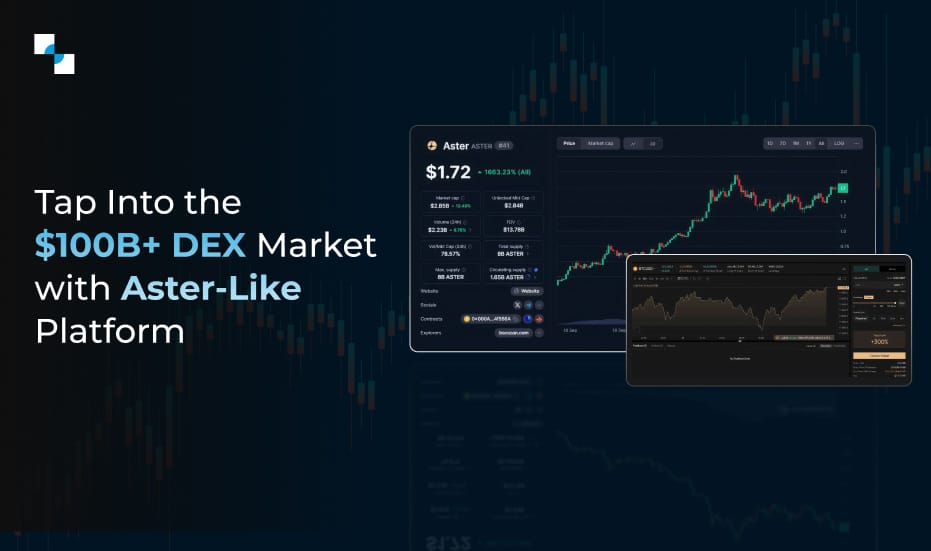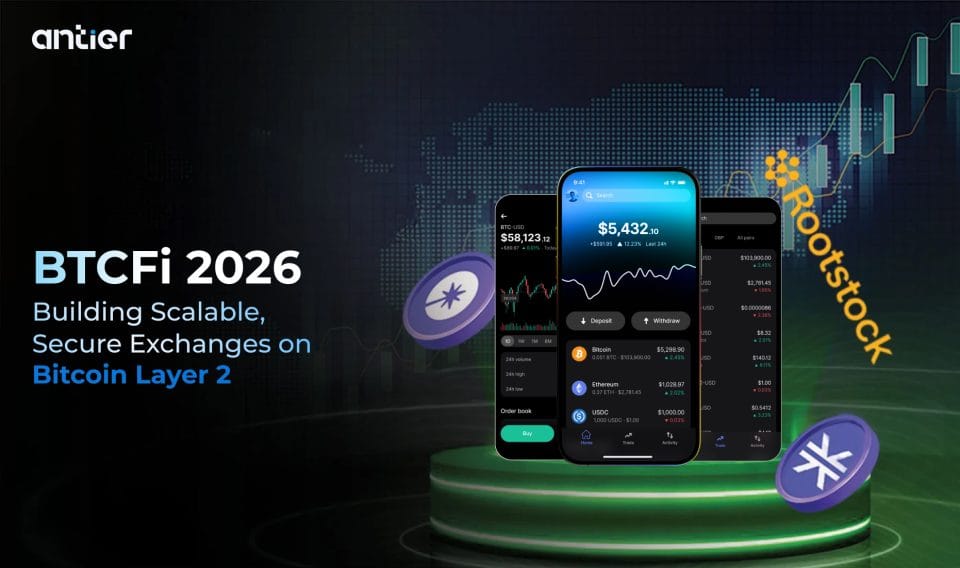Decentralized exchanges (DEXs) have emerged as a cornerstone of decentralized finance (DeFi), revolutionizing the way we perceive and interact with financial systems. Although businesses rely on different blockchains for DeFi exchange development based on their use cases, one blockchain that has gained immense popularity for building a decentralized exchange is Solana.
Solana is a high-performance blockchain platform known for its scalability and cost-efficiency. These attributes of Solana enable the development of efficient and user-friendly DEXs. However, building a successful decentralized crypto exchange software on Solana requires a comprehensive understanding of various technical, regulatory, and user experience factors. In this comprehensive analysis, we delve into eight essential considerations for DEX development on Solana.
- Mastering Solana’s Architecture
Before embarking on the journey of DEX development, it is imperative to understand the intricacies of Solana’s architecture and underlying principles. Solana’s unique consensus approach, which combines proof of history and proof of stake, enables unparalleled throughput and low latency, setting it apart from other blockchain platforms. Blockchain engineers of a DEX development company must familiarize themselves with Solana’s programming model, transaction processing capabilities, and smart contract functionality to leverage its strengths effectively and unlock its full potential.
- Scalability and Performance Optimization
One of the primary advantages of the Solana blockchain is its ability to handle thousands of transactions per second, making it an ideal option for building DEXs with high throughput. However, optimizing performance and scalability requires meticulous attention to detail in coding, smart contract design, and network architecture. This is when harnessing Solana’s parallel processing capabilities and minimizing latency serve as key strategies for ensuring smooth operation, especially during periods of high network activity. By optimizing these critical aspects, a DEX development company can create DEXs that can handle high trading volumes without compromising efficiency or user experience.
- Fortifying Smart Contract Security
Security is paramount in the decentralized finance space, where trustless interactions are foundational. It is crucial that smart contracts powering Solana-based DEXs undergo rigorous security audits to identify and mitigate potential vulnerabilities. Developers can employ different ways to ensure the security of smart contracts, such as employing formal verification methods, adhering to secure coding standards, and implementing robust authentication and access control mechanisms. Additionally, establishing a bug bounty program can incentivize ethical hackers to discover and report vulnerabilities before they are exploited. This can further strengthen the security paradigm of a decentralized exchange.
- Navigating Compliance and Regulatory Considerations
While decentralization is a core principle of DEXs, regulatory compliance remains a critical concern, particularly regarding know-your-customer (KYC) and anti-money laundering (AML) regulations. Decentralized crypto exchange software developers must create a balance between preserving user privacy and adhering to legal requirements, which may vary across jurisdictions. The implementation of decentralized identity solutions and integrating compliance tools can help mitigate regulatory risks while maintaining a seamless user experience. This ensures the DEX operates within the bounds of applicable laws and regulations.
- Enhancing User Experience and Accessibility
A user-friendly interface is essential for driving adoption and retention in decentralized exchanges. Developers should prioritize intuitive design, responsive performance, and seamless navigation to ensure that users can easily trade assets on the platform. The integration of features such as liquidity pools, automated market makers, and asset swapping functionalities can enhance the user experience and attract a broader audience of traders and investors, fostering a vibrant and active trading community.
- Fostering Liquidity and Robust Market Dynamics
Liquidity is the lifeblood of any exchange, decentralized or centralized. When it comes to DEX development on Solana, innovative strategies to enhance liquidity and foster vibrant trading markets must be followed. Such strategies can include incentivizing liquidity providers through yield farming rewards, liquidity mining programs, and fee-sharing mechanisms. By fostering a liquid and efficient market, DEXs can provide traders with seamless execution and competitive pricing, further enhancing the overall trading experience.
- Embracing Interoperability and Ecosystem Integration
DeFi exchange development on Solana involves more than just creating a standalone exchange platform. Developers should explore opportunities for interoperability with other blockchain networks, enabling cross-chain asset transfers and interoperable DeFi protocols. By collaborating with projects in the Solana ecosystem and integrating with popular wallets, aggregators, and analytics platforms, the exchange can enhance its visibility and utility, fostering a seamless and interconnected DeFi experience for users.
- Cultivating Community Engagement and Governance
Engaging with the community is essential for building trust, soliciting feedback, and driving community-driven development. Establishing transparent governance mechanisms, such as decentralized autonomous organizations (DAOs) or token-based voting systems, empowers stakeholders to participate in decision-making processes and shape the future direction of the exchange. DEX Business owners can build a vibrant and inclusive community around the DEX to cultivate loyalty and drive long-term sustainability, ensuring that the platform remains responsive to the evolving needs and preferences of its users.
To Sum Up
DEX development on Solana presents exciting opportunities for innovation and disruption in the DeFi space. By carefully considering the technical, regulatory, and user experience factors outlined above, businesses can create robust and resilient DEXs that provide efficient trading solutions while upholding the principles of decentralization and security. As Solana continues to gain traction as a leading blockchain platform, the potential for decentralized exchanges to revolutionize the financial landscape is boundless, paving the way for a more inclusive, transparent, and equitable financial ecosystem.







